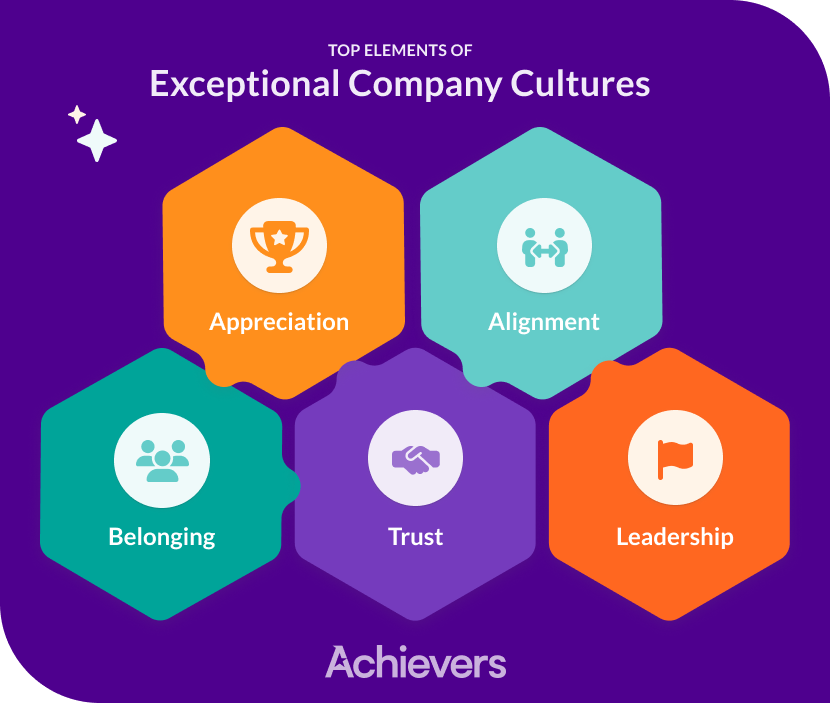Table of contents
What’s a make-or-break factor in business success? Company culture, of course. It’s more than just office perks and mission statements — it’s the values, behaviors, and environment that shape how employees work and feel every day. And it matters more now than ever.
In fact, a survey of 500 global CEOs revealed that 71% touted culture as a top factor that positively influences financial performance — up from 26% in 2021. A thriving culture fuels engagement, innovation, and retention, while a toxic one drives turnover and stagnation.
In this guide, we’ll break down what company culture really means, why it’s a powerful force behind business performance, and how you can build one that attracts top talent and drives success. Let’s dive in.
What is company culture?
Company culture is the shared values, behaviors, and norms that shape how employees interact and work together. It includes core values, leadership styles, workplace environment, and company traditions. A strong culture fosters engagement, innovation, and collaboration. Unlike mission and vision statements, which define a company’s goals and aspirations, culture is how those ideals come to life in daily operations. It influences decision-making, communication, and overall employee experience, making it a key driver of business success.
Why company culture matters now more than ever
Employees who feel valued and recognized are more likely to stay engaged and committed. In fact, Financial Times reports that employees who receive regular recognition are less likely to seek other jobs, showing that validation meets emotional needs beyond financial compensation.
As remote and hybrid work redefine the employee experience, culture has become even more vital. Without in-person interactions, organizations must be intentional about fostering connection, collaboration, and shared values. Investing in a strong culture today means building a workforce that thrives — wherever they are.
Signs of a strong vs. weak company culture
A company’s culture can make or break employee engagement, productivity, and retention. Here’s how to recognize the difference:
Green flags: Signs of a strong culture
- Psychological safety: Employees feel safe to voice opinions without fear of backlash.
- Frequent recognition: Hard work and contributions are consistently acknowledged.
- Open communication: Leaders encourage transparency and constructive feedback.
- Strong sense of purpose: Employees feel aligned with company values and mission.
- Employee growth and development: Opportunities for learning and career advancement are supported.
Red flags: Signs of a weak culture
- High turnover: Employees leave frequently, signaling dissatisfaction.
- Disengagement: Workers show minimal enthusiasm or connection to their roles.
- Lack of transparency: Decisions are made behind closed doors, fostering mistrust.
- Toxic work environment: Cliques, favoritism, or workplace hostility create tension.
- Resistance to feedback: Employee concerns are ignored or dismissed.

Top 5 elements of exceptional company cultures
Great organizational culture doesn’t happen by chance — they are intentionally built on key elements that drive engagement, retention, and overall business success. Here are five essential pillars of a thriving workplace culture:
1. Appreciation
Employees who feel valued are more engaged, motivated, and committed to their work. Regular employee recognition — whether through peer-to-peer praise or formal rewards — boosts morale and strengthens workplace relationships. Social recognition platforms like Achievers make it easy for organizations to foster a culture of appreciation, ensuring employees feel seen and celebrated for their contributions.
2. Alignment
When employees understand and connect with company core values and goals, they are more motivated and productive. Clear communication, goal setting, and reinforcing company purpose help employees see how their work contributes to the bigger picture. Regular check-ins and company-wide initiatives can keep alignment strong, driving business success.
3. Belonging
A strong culture makes employees feel valued, heard, and included. When people feel they belong, they are more engaged and loyal to their organization. Diversity, equity, and inclusion (DEI) initiatives play a crucial role in fostering belonging, ensuring every employee has a voice and opportunities for growth.
4. Trust
Trust is the foundation of collaboration, innovation, and long-term retention. Employees need to trust leadership, their peers, and the organization itself. Building trust requires transparency, consistent communication, and accountability — leaders must follow through on commitments and create an environment where employees feel safe to share ideas and feedback.
5. Leadership
Leaders set the tone for workplace culture, and manager effectiveness plays a critical role in shaping employee engagement, motivation, and morale. When managers lead with integrity, actively listen, and provide meaningful support, they create an inclusive and empowering environment. Organizations that prioritize leadership development ensure that managers at every level contribute positively to the employee experience, reinforcing a strong culture that drives performance and retention.
How to build and maintain a positive company culture
Creating a strong company culture requires continuous investment and intentionality. Organizations that prioritize culture see higher engagement, lower turnover, and stronger business performance. Here’s how to build and sustain a culture where employees thrive:
- Define and reinforce core values: Establish authentic values that guide decision-making. See real examples here.
- Prioritize employee recognition and rewards: Use social recognition to boost engagement. Achievers makes appreciation easy and impactful.
- Foster inclusivity and belonging: Invest in DEI initiatives, diverse hiring, and employee resource groups (ERGs) to create a welcoming workplace.
- Invest in employee experience: Offer professional development, flexible work, and wellness programs to support employees.
- Leverage technology for culture-building: Use AI and HR tech like Achievers to sustain engagement in hybrid workplaces.
Measuring and improving company culture
To understand how culture is impacting employees and business outcomes, organizations must track key HR metrics and take proactive steps to improve. Here are a few examples:
Key metrics to track
- Employee Net Promoter Score (eNPS): Measures how likely employees are to recommend the company as a great place to work. A high eNPS signals strong engagement and satisfaction.
- Engagement surveys: Regular pulse surveys provide real-time insights into employee sentiment, helping identify strengths and areas for improvement.
- Retention and turnover rates: High turnover often signals cultural issues, while strong retention suggests a positive work environment.
- Recognition participation rates: Tracking how often employees recognize one another can indicate whether appreciation is embedded in the culture.
How HR teams can continuously assess and refine culture
- Gather employee feedback regularly: Use surveys, one-on-one meetings, and focus groups to understand employee experiences and concerns.
- Leverage HR analytics: Platforms like Achievers Listen provide real-time cultural insights, helping HR teams track trends and take action.
- Act on feedback: Communicate survey results transparently and implement changes based on employee input.
- Reinforce company values: Ensure leadership models the desired culture and consistently reinforces company values through recognition and communication.
Strengthen your culture, strengthen your business
Workplace culture is a powerful driver of employee engagement, retention, and business success. A strong culture is built on appreciation, alignment, belonging, trust, and leadership, and it requires ongoing measurement and refinement. Leaders should assess their culture regularly, using key metrics like eNPS, engagement surveys, and retention rates to identify areas for improvement.
To cultivate a thriving workplace, organizations must define clear values, foster inclusivity, invest in employee experience, and leverage technology to sustain engagement — especially in hybrid environments. Tools like Achievers make recognition and feedback seamless, helping companies build cultures where employees feel valued and motivated.
Now is the time to take action. Evaluate your company culture, listen to your employees, and implement strategies that create a workplace where people thrive. Because a strong culture doesn’t just benefit employees — it strengthens your entire business.



